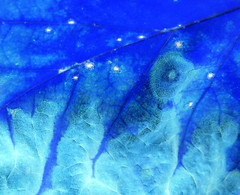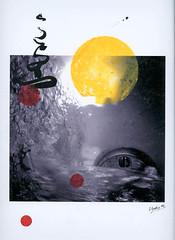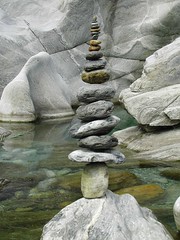What is the essence of this room? The furniture, the pictures, and so on are in the room, but they are not the room. The floor, walls, and ceiling define the boundary of the room, but they are not the room either. So what is the essence of the room? Space of course, empty space. There would be no “room” without it.
Since space is “nothing,” we can say that what is not there is more important than what is there. So become aware of the space that is all a round you… Pay attention to “nothing.”
Eckhart Tolle
Thursdays I usually join a few of my Taoists friends for an evening of meditation.
Recently events took an unexpected turn as Allan suggested we might enjoy seeing Elaine channel her higher-self.
“What?” was my initial reply.
Confused discussion followed until we just had Elaine do her thing.
What we saw was a woman go into a light trance, change her countenance, and then proceed to talk to us, dispensing a kind wisdom.
Afterwards I asked Allan to explain, for I suddenly realized we might not all be agreeing on the definition of “the higher Self.”
To me, the Self is pure consciousness, that emptiness of Awareness itself that Tolle describes as the Nothing, or pure Being.
It seemed to me that Allan was defining “higher Self” as a consciousness that still retained individuality and an awareness of X, Y, and Z.
While X, Y, Z might be wisdom that’s usually beyond me, this wisdom still falls short of what I regard as the true Self.
So, the channeling bothered me a bit.
This discrepancy in understanding of the Self is an issue I’ve continually wrestled with regarding my Taoist practice.
Now, I love my practice and am most grateful to have found it.
It has been immensely healing, beneficial, saved my bippy, and also fascinating.
But, Taoism has shamanic roots.
Because of this, there can be some pretty wild aspects to the practice.
We simply call this “moving energy.”
The old Taoists were masters of subtle energy.
They are the ones who discovered acupuncture meridians.
One way my friends and I cultivate the flow of subtle energy is through a practice we call “guided movements.”
Other traditions refer to this as “spontaneous qigong.”
And now, through the marvel of the internet, I discover that YouTube has videos in which traditions that feel Vedantic rather than Taoists display similar phenomena.
Here it’s called shaktipat, spontaneous kyrias and mudras, or more simply, kundalini.
What concerns me is when channeling and spontaneous movements are mistaken for the goal, rather than the means, of spiritual cultivation.
That concern got stirred up on Thursday.
My heart is set upon enlightenment.
My Taoists teachers down play this as a goal.
Instead, they emphasize, becoming “a good human being,” a lofty proposition in and of itself, and arguably more difficult than Awakening.
But, as I said, my heart is set elsewhere.
So, let me cut to the next scene of that Thursday night.
Mary and I are in her car and headed home, the traffic going by in a stream of lights, red and white currents in an ocean of black night..
I’ve already asked what she thought about the channeling and am fingering a box of CDs I had to move out of the way when I climbed into the car.
Mary kind of begs my question and starts in on what she likes about Deepka Chopra’s CDs.
“He’s saying that you can think about the space that fills a room as being like the Self.”
She then makes this huge, unstated comment:
The walls of the room may come and go, as did her son, Charlie.
But, the Self that was Charlie, the Self that abided in the room that we called Charlie – that Self is immortal, even while Charlie is forever gone.
And with these unstated implications something began dropping through me.
Something, indescribable moved. Down, down, down. In and through.
What was this?
I thought I ought to melt into a flood of tears in lieu of adequate speech.
But, I had no tears.
I could only say, “I am so glad you see.”
It seemed so long that a friend had understood… all the way down.
Somewhat else understood the love and longing that I feel for something beyond words.
It was if I have been haunted by the unspoken.
And it’s why some words have jumped out at me as I come across them on the internet.
Like Kate, writing of a woman in her fifties staring over in a new place:
Suddenly, I’m beginning to ‘see’ into the spaces in between things, into the interstices…it’s as if the surfaces of trees and bushes and dirt roads and stones and fences recede, or change in some way… so that the spaces they’d occupied stand out.
Everything for a moment is changed, as if reality has not fallen away but become more real.
Yes, you could put it that way.
The space within the interstices, where reality becomes more real.
Or there were these words in a poem by Pincushion:
Can you hear
The space between spaces
It calls to me…
The space between spaces
Overflows-
My heart cannot contain
It aches –
The space between spaces
Is…
Still
still
still
And that was what washed through me.
The internet’s anonymity almost seems most fitting.
Can you hear the space?
Pinchusion knows you can, as the kundalini dances.
Nothingness Itself longs for it’s Self.
And the route of the returning home is through my body.
Our bodies are the channels,
Words and tears and mudras the rivulets.
I see that now as Nothing haunts me.
(I've included many links here. Please take them as illustrating my point that Qigong and Kundalini can stir energy in similar ways. I am not in any way endorsing any particular teacher or practice. I don't know any of the teachers in the YouTube videos, nor do I know the writers describing spontaneous Qigong and kriyas. However, I do agree with alot of what they say.)







